Sustainability
Climate Action
Initiatives and Progress to Reduce Greenhouse Gas (GHG) Emissions
To achieve carbon neutrality throughout the entire value chain, we are first working on energy-saving and renewable energy power plans for office electricity. For offices that cannot transition to more energy-saving menus or renewable energy power plans, we use Renewable Energy Attribute Certificates*¹ which satisfy the strict criteria of RE100*².
Even after that, if there are any residual emissions, we use removal credits that connect to solving various SDGs issues including climate change to contribute to the planet and environment as a whole, for example tree planting removal credits certified by international accreditation bodies.
Please refer to "Climate Change" in the ESG Data Book for details on Recruit Group's progress to reduce greenhouse gas (GHG) emissions. The ESG Data Book describes the calculation method, scope of calculation, amount of GHG emissions, and our activities to reduce them.
*1 Renewable Energy Attribute Certificates represent electricity generated and delivered to the grid from a renewable source. They comply with the Greenhouse Gas Protocol which establishes global standards to measure and manage emissions.
*2 Referenced the RE100 TECHNICAL CRITERIA Version 3.0
Our Initiatives (Scope 1+2)
Each company within Recruit Group umbrella is taking advantage of its specific business characteristics to reduce its GHG emissions.
Sustainable Office Operations
Recruit is shifting towards renewable energy power at its offices as a way to reduce GHG emissions resulting from our business activities. The switch to renewable power is progressing smoothly at 10 of their major offices in Japan, including at our GranTokyo South Tower headquarters, Osaka Umeda Twin Towers North, and Kudanzakaue KS Building in Tokyo.
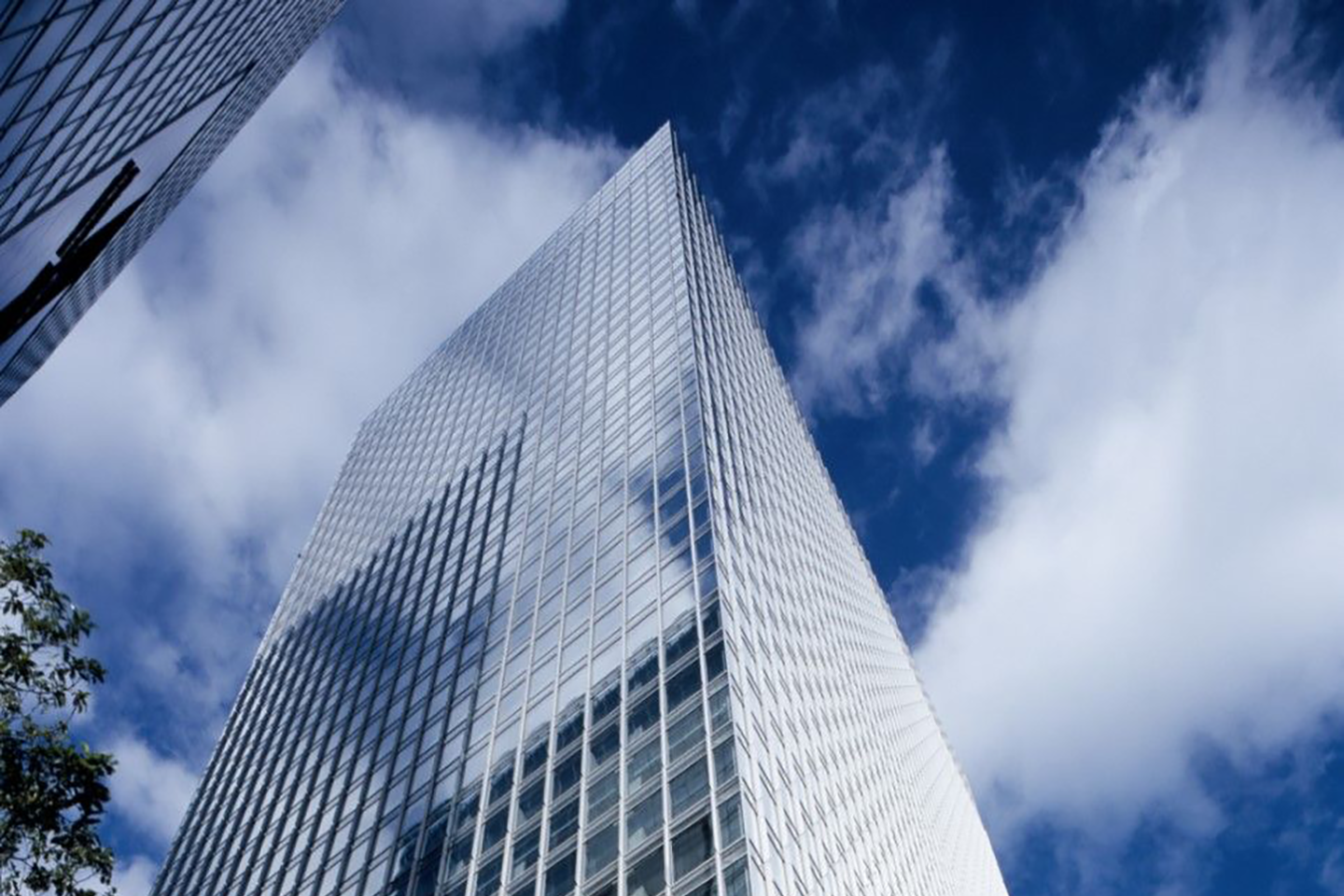
To make a significant impact in this area, the understanding and cooperation of building owners are essential. At Recruit Group, we work closely with our building owners by sharing our goals and commitment to climate change countermeasures and help foster greater understanding around the importance of renewable energy by having open discussions and working hard to build a culture of trust and cooperation.
In August 2023, Indeed celebrated the grand opening of its new headquarters, Indeed Tower, in Austin, Texas, USA. Embodying the company's sustainability commitments, the building is a central hub for fostering a positive impact on society. Construction of the building encompassed environmental concerns and the wellbeing of employees. The building, as a testament to this, has targeted LEED Gold certification*1 . The core and shell have achieved the highest LEED Platinum certification, with the interior build-out of Indeed’s space progressing toward a Gold rating.
Environmental and human health impacts were considered at every stage from the conceptualization to occupancy. Access to quality transit, availability of bicycle facilities, water efficiency, advanced energy metering, enhanced refrigerant management, use of VOC products and recycled materials, product life-cycle assessments and indoor air quality were all factored in.
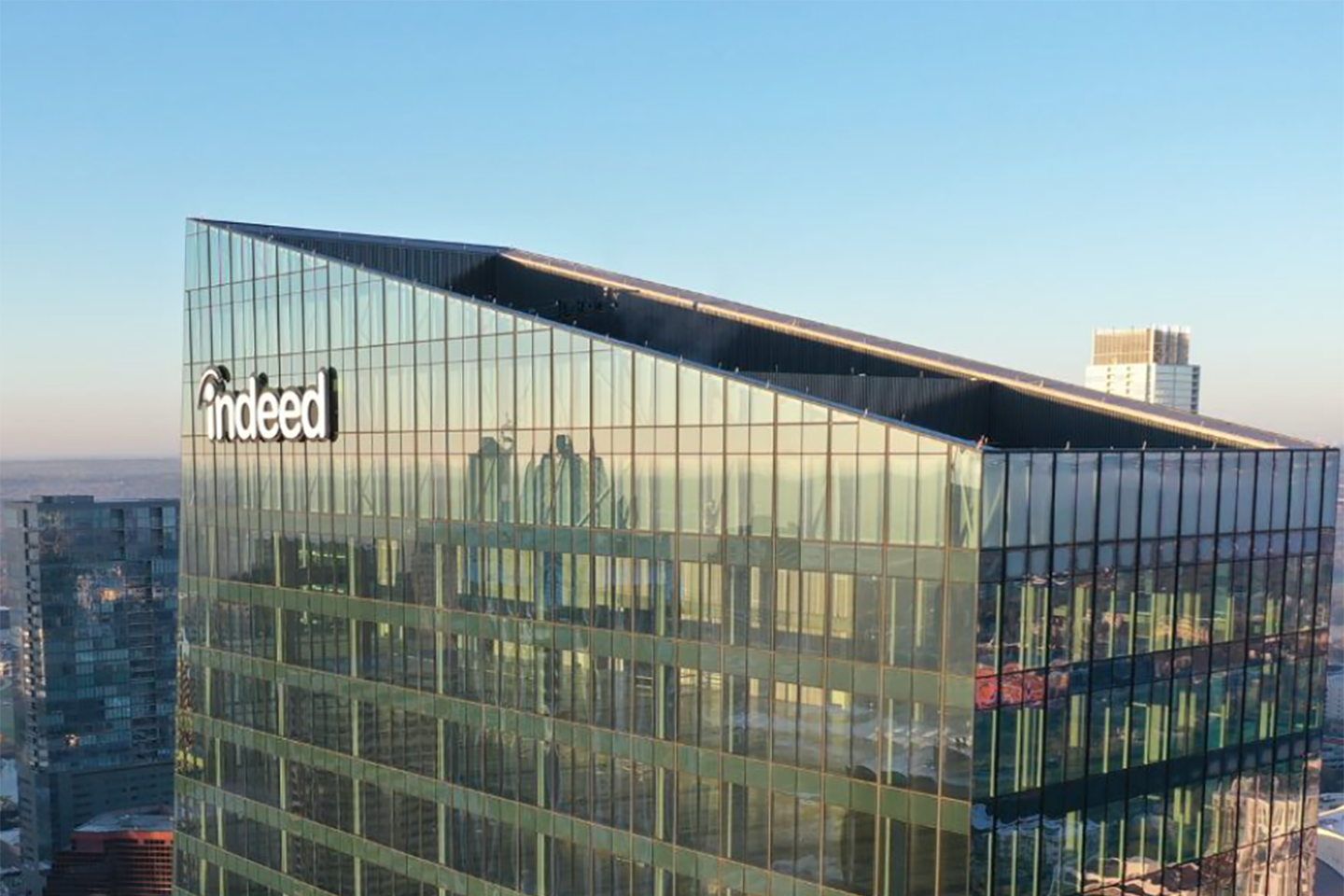
*1 A certification program developed and administered by the U.S. Green Building Council (USGBC). It is a globally recognized symbol of sustainability achievement.
RGF Staffing, our Group company providing HR and staffing services around the world, is implementing energy efficiency measures to reduce GHG emissions at its offices in different countries and is working toward more sustainable office operations.
Asia-Pacific
RGF Staffing APEJ has reduced its office size by enabling hybrid working.
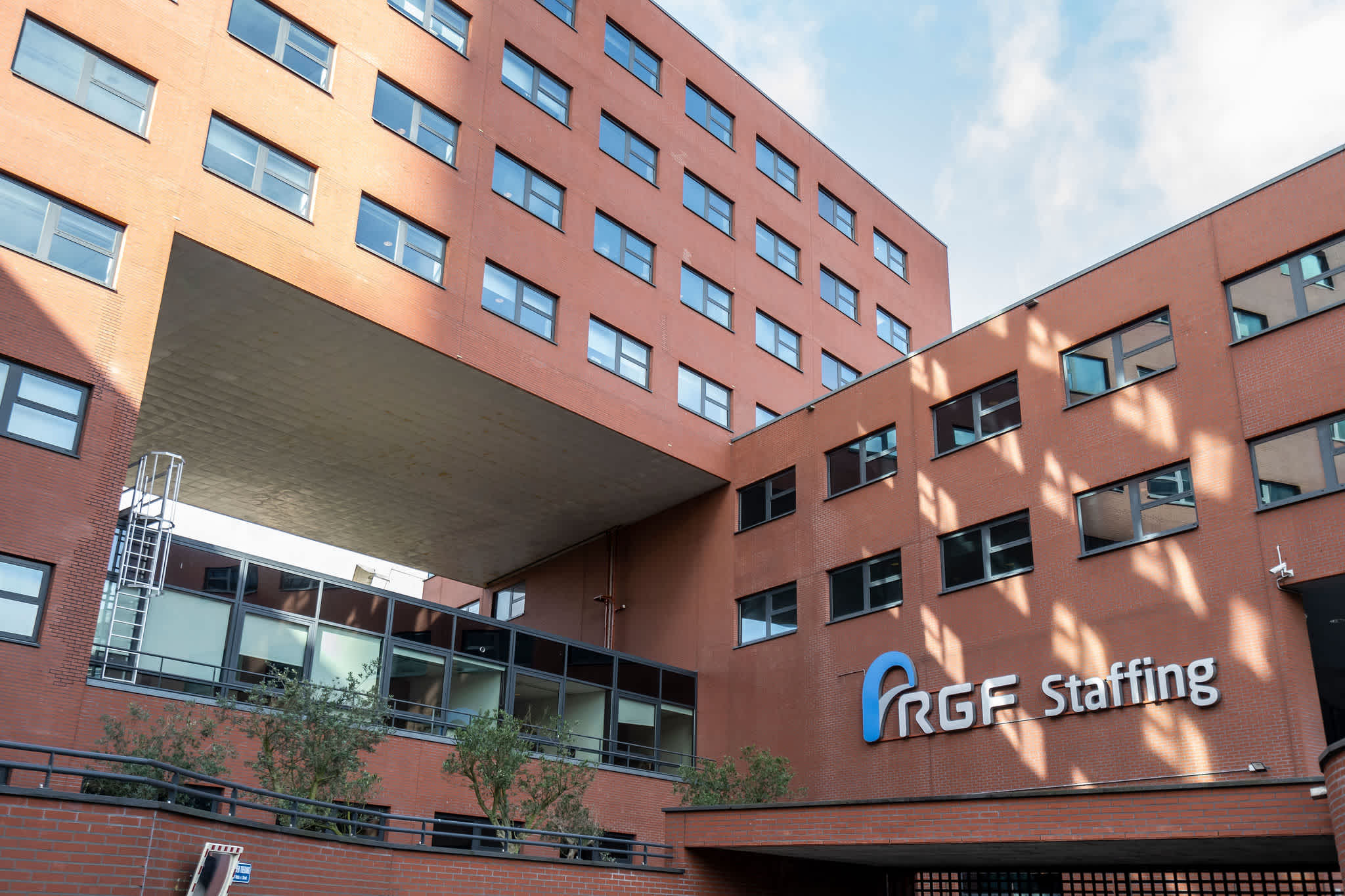
Europe
RGF Staffing Germany’s offices are almost entirely powered by renewable energy, and at RGF Staffing Belgium LED lighting and motion detector light switches are becoming the standard. RGF Staffing the Netherlands has created a system for selecting energy-efficient spaces when choosing a new office location and is also testing new energy-saving technologies at one branch, with a view to rolling out the technology across all branches if found to be effective.
Our Initiatives (Scope 3)
In addition to reducing GHG emissions in our business activities, we will accelerate efforts to reduce GHG emissions in the value chain, which accounts for more than 95%*1 of the Recruit Group's overall GHG emissions.
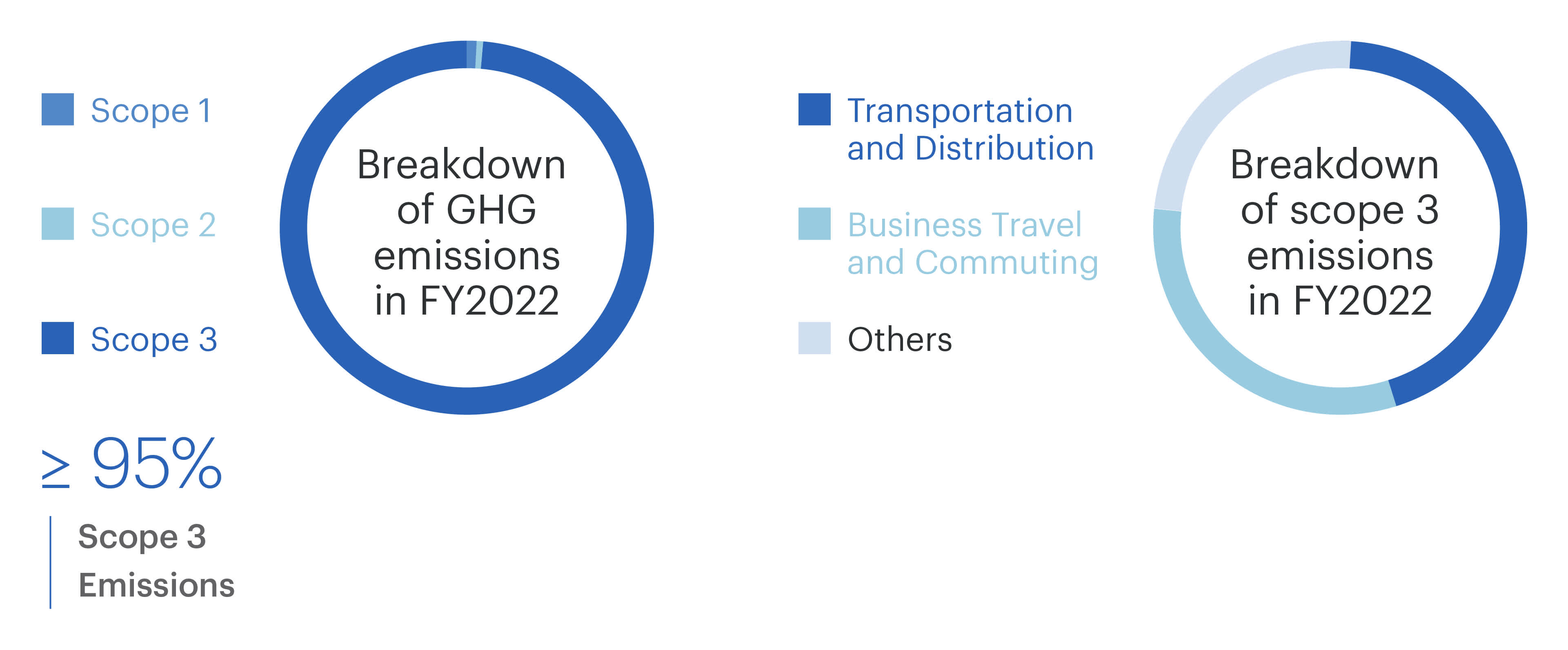
In particular, we promote remote work to reduce emissions from commuting, as well as partner engagements with companies in the value chain. In FY2024, we will strengthen engagement activities, expanding partnerships, and planning and implementing specific measures to reduce the emissions in the value chain together.
*1 Based on the emissions of FY2022.
Collaborating with partners to boost the speed and reliability of GHG emissions measurement and reduction
Matching & Solutions SBU’s Recruit is approaching Scope 3 GHG emission reduction collaboratively by focusing on refining emission measurements with partner companies, including NTT DATA Corporation and Japan Airlines Co., Ltd. By understanding our Scope 3 emissions in greater detail, we can consider more effective and specific measures to reduce them.
These initiatives are extending to other Strategic Business Units (SBUs). For example, Indeed, a part of our HR Technology SBU, has initiated collaborations with six partner companies and is exploring strategies to minimize GHG emissions. Discussions are also underway regarding partner training programs to raise awareness. Meanwhile, our Staffing SBU is conducting an analysis to identify the primary sources of emissions related to temporary employees' transportation to reduce emissions from commuting and travel. It is also preparing for discussions with public transportation systems, such as railroads, to explore the possibility of transitioning to lower GHG emission energy sources. SBUs are also actively working together to foster partnerships with companies that are shared across multiple SBUs.
This collaborative, cross-group structure is driving collective efforts to reduce GHG emissions.
Employee transportation — a hybrid approach for sustainable impact
The Scope 3 emissions of our staffing businesses can be primarily attributed to the commute and travel of our people, including employees and placed workers. Scope 3 emissions are considered those beyond the value chain, and Recruit Group is addressing them as part of its environmental responsibility to become an industry leader in reduction efforts.
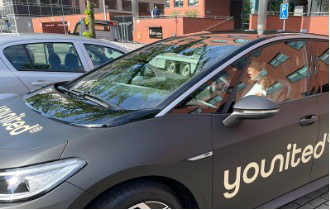
As a start, to accurately assess the GHG emissions from commutes, we have started measuring them by confirming the distances and modes of transportation from each placed worker's home to their workplace. Furthermore, when introducing job opportunities, we propose placements as close as possible to the staff's residences within their preferred job categories.
Meanwhile, in the Netherlands, our RGF Staffing team plans to shift its corporate fleet to electric by 2027, and Staff Service Holdings and Recruit Staffing in Japan have also declared they will switch their sales fleet to electric or hybrid vehicles by 2030.
Initiatives Regarding Data Centers
IT technology is a core element of all of the Recruit Group's businesses. We have sought to consolidate our data centers and IT equipment, and use environmentally friendly data centers. Further efforts to reduce the environmental impact of our online services include investing in the very latest IT and network equipment, through which we have reduced the amount of equipment and lowered our power consumption. In these ways, we have been striving to reduce total GHG emissions from our online service operation.
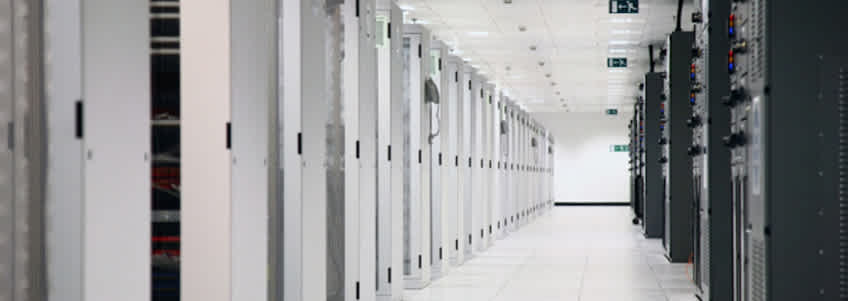
Holding of the “Green Hackathon”
Indeed is approaching GHG emissions reduction by utilizing the energy and creativity of its staff. The company holds a “Green Hackathon'' twice a year where the overarching aim is to contribute to reducing GHG emissions through Indeed’s products, services and technologies. At the event, participants identify environmental issues they aim to tackle, recruit like-minded team members, and then have three days to put their ideas together before giving a final presentation.
The spring 2022 hackathon resulted in eleven ideas, of which three won the Environmental Impact Award, an internal award given to new ideas to recognize the initiatives that help Indeed accelerate GHG reductions. One of the examples is “Indeed Interviews,” a service highlighting how much GHG emissions can be saved if job seekers choose virtual interviews over in-person ones. The aim of the service is to evolve the existing interview system into one where both the job seeker and the company have a sustainable impact.
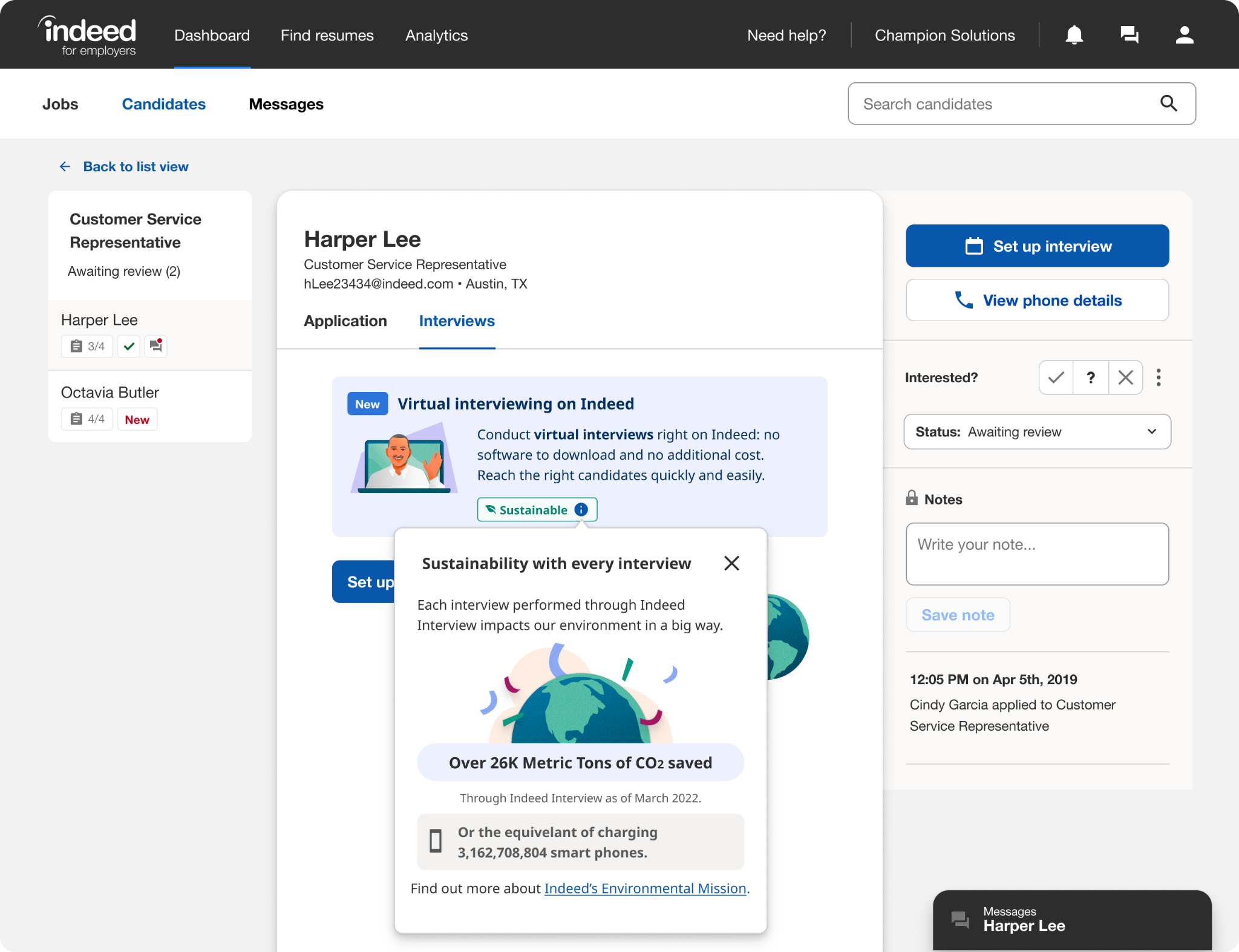
Initiatives Regarding Information Magazine Services
The Matching & Solutions SBU publishes a wide range of magazines (more than 100 million copies in 2017), and we continually take steps to minimize the impact of our environmental footprint, from the production stage through to distribution.
Measures we have taken include reducing the thickness of the paper while maintaining a quality texture and avoiding show-through. Additionally, we ensure that all offcuts inevitably produced from the bookbinding process are carefully collected and recycled.
We also strive to keep our carbon footprint as low as possible at the stage when the publications make their way to magazine racks across Japan. First of all, we manage our own fleet of haulage vehicles, allowing us to take full control of our magazine’s supply chain. By optimizing delivery frequency and freight consignment efficiency, we have reduced the number of trucks on the road.
Furthermore, we utilize cutting-edge technology and AI to accurately calculate the exact number of copies that match the demand of each magazine rack at any location—what is known as the “takeaway ratio.” This helps us ensure every magazine gets into the hands of every person who wants one and thereby minimizes leftover publications. Our contracted paper recyclers collect any surplus magazines that didn’t reach readers and deliver them to paper manufacturers, where they are recycled into cardboard and other paper products.
Climate related Risks and Opportunities
We only have one planet, and everyone has a responsibility to protect the health and longevity of our home. Recruit Group has committed to climate action by setting climate change countermeasures and is implementing initiatives based on climate change scenario analysis. We have identified climate related risks and opportunities for our businesses.
Scenario Analysis
Scientists have predicted that a rise in average global temperature brought about by climate change will likely cause a major impact on the environment and the earth's ecosystems. Significant environmental changes will directly affect the activities of corporations, and therefore we must analyze the potential risks. However, it is challenging to determine the direct course of action because the exact environmental changes we will experience remain unclear. Therefore, we studied multiple scenarios to envisage the future environment surrounding our business and to analyze the assumed risks and opportunities we may encounter due to rising temperatures*¹.
We based our assumptions on two scenarios, the "4°C Scenario"*² and the "1.5°C Scenario."*³ The former assumes a significant impact on the natural environment and ecosystems, while the latter implies a relatively substantial climate change response burden on the company side. Under each scenario, we considered the risks and opportunities posed to Recruit Group's business in the short, medium, and long term and performed a thorough assessment of the likelihood of occurrence and financial impact. The risks and opportunities for change identified through evaluation were labeled as "significant impacts." Then, after consultation with the Sustainability Committee and the Board of Directors, we resolved our course of action.
*1 In this scenario analysis, we refer to reports issued by international organizations such as the IPCC (Intergovernmental Panel on Climate Change) and the International Energy Agency (IEA) and equivalent research organizations.
*2 Environmental changes assumed when the global average temperature rises by 4˚C compared to pre-industrial levels.
*3 Estimated changes in the environment if the global average temperature rise is limited to 1.5˚C above pre-industrial levels.
Climate-related Risks
The main risks posed by climate change include soaring carbon credit prices, taxes, and timber and transportation costs. In response, we aim to achieve carbon neutrality in terms of GHG emissions throughout our business activities and value chain by FY2030, and have already implemented various risk mitigation measures.
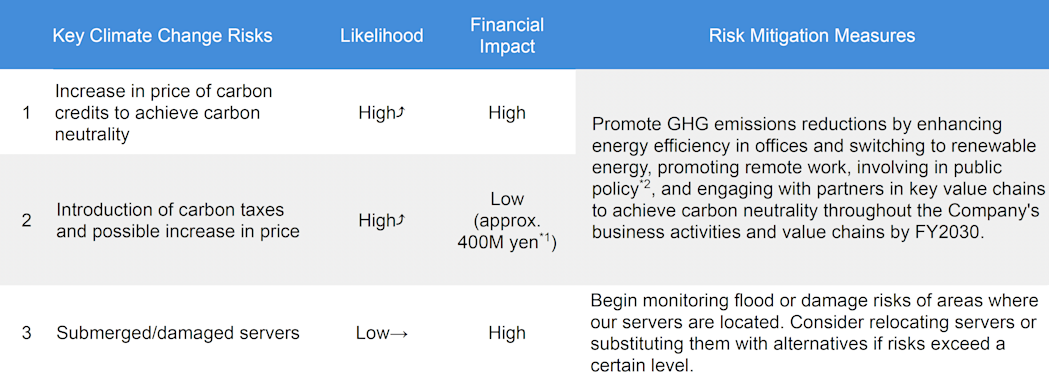
*1 The estimated carbon tax in FY2030 is based on the following assumptions:-
・ Carbon tax price: approximately $300/t-CO2 (Ref. 2023 version, Net Zero 2050 scenario of the NGFS Climate Scenarios for central banks and supervisors provided by International Institute for Applied Systems Analysis)
・ The Company's GHG emissions throughout its business activities (Scope 1 & 2): Approx. 9,600t-CO2 based on the assumption that there is no change in the Scope 1 emissions from FY2022.
*2 Recruit Group evaluates the feasibility of all climate-related engagement activities (including partnerships with stakeholders in the value chain, the consideration of trade association memberships, public policy engagement and other related activities) in line with the Paris Agreement and our goals on environmental strategy, which are then approved by the responsible Senior Vice President for execution. This analysis did not identify any physical or transition risks with significant impacts on the Company’s business strategies. Nonetheless, under the governance structure described above, we will continue to closely monitor and reassess the impact of climate change on our group as well as enhance our disclosures of relevant information.
Acute physical risks: Increased severity of extreme weather events
We put in place a BCP (Business Continuity Planning) to prepare against natural disasters.
We provide regular safety confirmation drills and lectures on initial disaster response to ensure employee safety.
We have emergency stockpiles in place at all premises. Also, stocks are kept in external warehouses to allow delivery of relief supplies to affected areas in the event of a disaster.
We have a web-based system in place that shows real-time information on affected areas and damage statuses.
Before signing a lease agreement, we check the property according to our evaluation criteria, including compliance with the new seismic standard, to prepare against earthquakes.
Climate-related Opportunities
The main opportunities for change derived from environmental shifts include new employment needs and necessary changes in work styles as we transition to a low-carbon society. For example, the demand for staff with specific environmental knowledge and skill sets will increase as society focuses on countermeasures to combat climate change. Workstyle needs will also have to diversify if the place and time of work change due to rising temperatures.
We anticipate that if we can speed up the alignment of job matching with these changes, it will lead to significant business opportunities. Our team will continue to monitor global trends and assess the scope of impact derived by climate change. Based on our findings, we will take the most appropriate action with a view to expanding our business opportunities.

